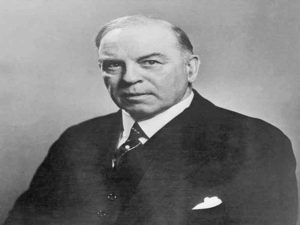On June 8, 1939, Prime Minister William Lyon Mackenzie King, head of a Liberal government that had won power four years earlier, was in Washington, D.C. He was escorting King George VI and Queen Elizabeth on their royal tour and enjoying a splendid lunch with President Franklin D. Roosevelt and his family at the White House.
Over tea, the conversation eventually got around to the matter of the SS St. Louis, a ship that had left Hamburg with 937 passengers. Nearly all those on board were German Jews fleeing the Nazi regime with the hope of finding refuge in the United States. The ship, which had departed on May 13, was bound for Cuba. Except when the St. Louis reached Havana two weeks later, the Cuban government refused to accept their landing certificates and transit visas. More than seven days later, no South or Central American country would provide the Jewish refugees with a safe haven. And the U.S. and Canada, both ostensibly still recovering from the Great Depression, did not want them either.
‘king feared that there would be riots if too many Jews were allowed entry’
King listened attentively to FDR’s views on the matter, about how “immigration laws … placed certain restrictions” on permitting the Jews into both countries, and then decided that this was not Canada’s problem to solve. (From 1933 to 1945, the U.S. allowed in more than 200,000 European Jewish refugees; while Canada accepted slightly more than 5,000.) Other Canadians – including historian George Wrong, B.K. Sandwell, the editor of Saturday Night magazine and Robert Falconer, the former president of the University of Toronto – disagreed. They urged King to show “true Christian charity of the people of this most fortunate and blessed country.”
Yet the prime minister remained firm in his resolve to keep the Jews out. He heeded the advice of Ernest Lapointe, the minister of justice and his influential Quebec lieutenant, who staunchly opposed Jewish immigration because Lapointe knew that the vast majority of Quebecers opposed it – and Liberal power in Ottawa was somewhat contingent on winning most, if not all, of the province’s 65 parliamentary seats in future elections.
READ: WHY AN APOLOGY FOR THE ST. LOUIS IS MEANINGLESS TO ME
King was influenced as well by Frederick Blair, a longtime civil servant, who in 1936 became the director of the Immigration Branch. Blair was one of the most vocal opponents of Jewish immigration to Canada. Classically, as Irving Abella and Harold Troper note in their 1982 book, None is Too Many: Canada and the Jews of Europe 1933-1948, Blair did not consider himself to be anti-Semitic, merely “realistic about Canada’s immigration needs and about the unsuitability of the Jew to those needs.” The country did not have an official refugee policy at the time, so the German Jews had to be considered under the restrictive immigration regulations of the day and Jews were not “preferred” immigrants under any circumstance.
In what was to be one of the definitive statements of this whole sorry ordeal, Blair told Oscar Skelton, the undersecretary of state for external affairs, that the Jews on the St. Louis did not meet Canada’s immigration rules and that no country could “open its doors wide enough to take in the hundreds of thousands of Jewish people who want to leave Europe: the line must be drawn somewhere.”
By the time Blair had written those sharp words, the St. Louis and its 907 Jewish passengers were on their way back to Europe. Nearly 300 of them managed to get into Britain and the rest found temporary refuge in France, Belgium and Holland. Of the 620 who returned to continental Europe, 254 perished during the war.
‘At one cabinet meeting in late 1938, king astutely urged his ministers to “view the refugee problem from the way in which this nation will be judged in years to come”‘
Though Blair and King are the villains of this saga – and legitimately so – King, at least, was not unsympathetic to the plight of the refugees. (On more than one occasion, the Nazis’ treatment of the Jews haunted King’s dreams and troubled his sleep.)
READ: BUDDHIST ACTIVIST CALLS FOR JEWS TO HELP MYANMAR’S ROHINGYA PEOPLE
In November 1938, after King had learned of the destruction of Jewish shops and synagogues in Germany on Kristallnacht, the night of broken glass, he was deeply upset by the news of this violence. “The sorrows which the Jews have to bear at this time are almost beyond comprehension,” he recorded in his diary. “Something will have to be done by our country.” But he was not quite certain then, or later, what exactly he could do.
This owed partly to the fact that King shared the anti-Jewish sentiments that were ingrained into Canadian society for the 19th and good part of the 20th centuries. He understood, as he reasoned in a diary entry of August 1936, that “there are good as well as bad Jews and it is wrong to indict a nation or a race.” But two years later, as the pressure mounted to admit more Jewish refugees, he wrote, “My own feeling is that nothing is to be gained by creating an internal problem in an effort to meet an international one.”
Echoing the popular eugenics ideas of the day, he wanted to prevent the “intermixture of foreign strains of blood.” He feared that there would be riots if too many Jews were allowed entry. In short, it was politically advantageous to just say no to the ongoing lobbying efforts of the few Jewish members of Parliament and the community’s leaders who beseeched the Liberal government to admit more refugees.

From 1935 onward, the subject of the German-Jews came up frequently at cabinet meetings. Yet only a few of King’s ministers were prepared to crack open the country’s doors “on humanitarian grounds.” The majority, led by Lapointe, favoured keeping it tightly shut. Nor were Lapointe and his followers – and King was on side with them – swayed by the Jewish community’s offer to accept complete economic responsibility for upwards of 10,000 refugees.
King did keep trying, however, to win over his colleagues. At one cabinet meeting in late 1938, he astutely urged his ministers to “view the refugee problem from the way in which this nation will be judged in years to come, if we do not play our part, along with other democracies, in helping to meet one of humanity’s … needs.”
Adding, as well, of his belief in the “fatherhood of God and the brotherhood of men,” and that as a government, “we would have to perform acts that were expressive of what we believed to be the conscience of the nation, and not what might be, at the moment, politically most expedient.” This plea fell on deaf ears, as it did at subsequent meetings.
Pierre Trudeau, about to retire as prime minister, declared, “I do not think it is the purpose of a government to right the past. I cannot rewrite history”’
Various excuses were raised – the provinces had to be consulted and anti-Semitism might rise – but the bottom line was that most members of the government just did not want to let any Jews into the country. “We don’t want to take too many Jews,” observed Norman Robertson, who worked under Skelton at the external affairs department, “but, in the present circumstances particularly, we don’t want to say so.”
Neither King, nor FDR, or any other leader of a Western country who refused Jewish immigrants could have predicted the tragic fate that awaited millions of European Jews in ghettos, and at Auschwitz and the other Nazi death camps. At the same time, given the reports of boycotts, violence against German Jews, synagogue burnings and forced fines, King could have shown true leadership on this issue, if he had wanted to.
Now, nearly eight decades later, one of King’s Liberal successors, Prime Minister Justin Trudeau, soon will formally apologize, specifically for the treatment of the St. Louis passengers, and generally for the anti-Jewish, “none is too many” immigration policy. This will be yet another in a long list of federal government apologies for past transgressions: the internment of the Japanese during the Second World War, the imposition of a head tax on Chinese immigrants and the terrible treatment of indigenous Canadians in the residential schools system.
Last year, Trudeau issued his first official apology for the 1914 Komagata Maru incident, in which hundreds of Sikh, Muslim and Hindu passengers who arrived on a ship in Vancouver were denied entry into the country.

Decades after the fact, such apologies – the residential school system apology is a significant exception – are merely symbolic, though currently fits well with Trudeau’s self-righteous approach to governing. His father, former prime minister Pierre Trudeau, had a different view. Asked in 1984 by Brian Mulroney, who was then the Opposition leader, to apologize to Japanese Canadians for their wartime internment, Trudeau, who was about to retire as prime minister, declared, “I do not think it is the purpose of a government to right the past. I cannot rewrite history.”
He had a point. The leaders of the Canadian Jewish community have already indicated their enthusiastic approval for the coming apology for the St. Louis
incident. For a few days, the apology, once it is delivered, will garner media attention and positive comment. But the past indeed cannot be changed. While anti-Semitism persists in Canada, and likely always will, the lives of Canadian Jews are no longer impeded by the entrenched discrimination of Mackenzie King’s day and have not since at least the mid-to-late 1960s. Trudeau’s apology simply reflects this progressive change of values and attitudes.
Historian and writer Allan Levine’s next book, Seeking the Fabled City: The Canadian Jewish Experience, will be published in 2018.
